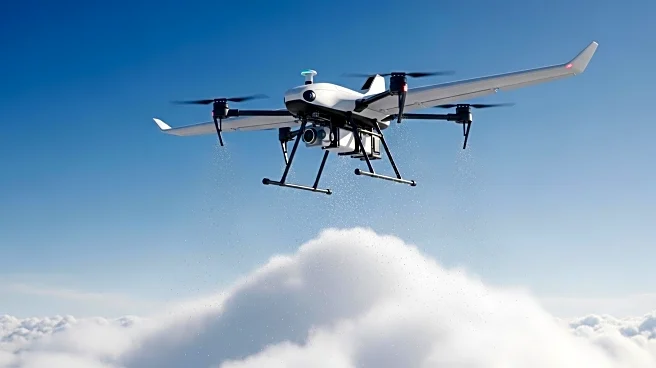What is the story about?
What's Happening?
Rainmaker Technology's proposal to use drones for cloud-seeding operations is facing opposition from the Air Line Pilots Association (ALPA), which has urged the Federal Aviation Administration (FAA) to reject the plan unless stricter safety measures are implemented. The startup seeks an exemption from regulations that prohibit small drones from carrying hazardous materials, aiming to deploy cloud-seeding flares on drones to induce precipitation. The FAA has not yet made a decision and has requested additional information regarding the safety and operational specifics of Rainmaker's proposal. ALPA has raised concerns about the safety risks, including the potential for foreign object debris and fire hazards, and criticized the lack of detailed trajectory modeling and environmental impact analysis in Rainmaker's petition. The union's objections highlight the broader debate over the safety and environmental implications of using unmanned aerial systems for weather modification.
Why It's Important?
The FAA's decision on Rainmaker's proposal could have significant implications for the future of weather modification technologies and the use of drones in such operations. If approved, it could pave the way for more widespread adoption of drone-based cloud-seeding, potentially offering a safer and more efficient alternative to traditional methods involving crewed aircraft. However, the concerns raised by ALPA underscore the need for rigorous safety and environmental assessments to ensure that such technologies do not pose undue risks to aviation safety or the environment. The outcome of this case could influence regulatory approaches to emerging technologies in the aviation and environmental sectors, impacting stakeholders ranging from technology startups to environmental advocacy groups.
What's Next?
The FAA's forthcoming decision will be crucial in determining the regulatory landscape for drone-based cloud-seeding operations. Should the FAA approve Rainmaker's proposal, it may set a precedent for similar technologies, encouraging innovation in the field of weather modification. Conversely, a rejection could prompt Rainmaker and other companies to refine their safety protocols and environmental assessments to meet regulatory standards. The decision will likely attract attention from various stakeholders, including environmental groups, aviation safety advocates, and technology developers, each with vested interests in the outcome.
Beyond the Headlines
The debate over Rainmaker's proposal also touches on broader ethical and environmental considerations surrounding geoengineering and weather modification. The potential for unintended consequences, such as ecological disruption or geopolitical tensions over resource allocation, highlights the need for comprehensive regulatory frameworks and international cooperation. As climate change intensifies, the demand for innovative solutions like cloud-seeding may grow, necessitating careful consideration of the long-term impacts and ethical implications of such technologies.















